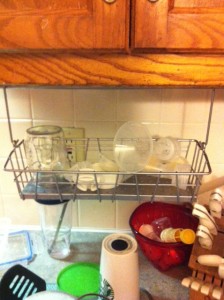 I’ve started listening to NPR on the few kid-less car trips I take. Last Wednesday morning after Crossfit I heard an interesting bit about a new social-psychological phenomenon called “The IKEA Effect”. You can find the audio and a NPR certified summary of the piece here.
I’ve started listening to NPR on the few kid-less car trips I take. Last Wednesday morning after Crossfit I heard an interesting bit about a new social-psychological phenomenon called “The IKEA Effect”. You can find the audio and a NPR certified summary of the piece here.IKEA sells simple, stylish UNASSEMBLED furniture in boxes. As the consumer, you pack the box in your car, drive it home, and follow scant and mostly Swedish instructions to assemble a piece of furniture as simple as a towel rod or as complicated as a kitchen cabinet system.
Visits to IKEA stores in Seattle, Chicago and Denver have offered me enjoyable and adventurous shopping experiences with my family and have yielded treasures like brightly colored plastic bowls and plates my kids use  daily, a wok (from the Swedish store for Asian dishes I make in KC), countless cute paper napkins and some picture frames- note no great assembly acquired on most items I buy. However, I’ve shopped and Drew’s has had to enter into the IKEA aftermath- assembly. We have this basket to hold baby bottle paraphernalia.
daily, a wok (from the Swedish store for Asian dishes I make in KC), countless cute paper napkins and some picture frames- note no great assembly acquired on most items I buy. However, I’ve shopped and Drew’s has had to enter into the IKEA aftermath- assembly. We have this basket to hold baby bottle paraphernalia.
It came with no hardware so Drew was off to Lowes to find the right, random-sized screw. Perhaps our greatest achievement is the art clothes line in our kitchen. It sat unassembled for months before we tackled the project one Saturday afternoon. It’s been up for a year and I love it. Way to go us for getting it up there in just under an hour one day!
The scientist and marketing professor in the NPR story wondered why, if IKEA products require a lot of work, labor, and effort on the part of the consumer, do people flock to IKEA?
They named their discovery “The IKEA effect.” The IKEA effect says people attach greater worth and value to something they build themselves than they do to a product built by someone else.
Most emotional science supports the notion that love for something leads to labor on that something’s behalf. The example in the story was a difficult, misbehaving, too big, too wild, up all night dog owned by a man. The man’s friend said, “Wow, because you love your dog so much, you’re willing to do a lot of work for him.” But then later wondered, if instead it was because of all the work on the dog’s behalf, that the man loved his dog.
The heart of the IKEA effect is this difference: instead of loving something so much we’re willing to work for it, sometimes it’s because we work hard for something that we fall in love with it. Usually, love leads to labor… but here , labor leads to love.
With IKEA furniture, people (myself included) think, “Since I’ve built it, it has value. I love it and find it more valuable than one assembled by a professional, even if it has flaws due to my workmanship.” We IKEA-ers, feel proud and encouraged in our furniture building competence.
I think the IKEA effect points to some risks and some helpful realities.
There is risk in falling so in love with our own ideas, the product of our creative elbow grease, that we can become skeptical of outside ideas and lose the ability to evaluate the actual merit of our own ideas. We become attached to the idea because we’ve put so much work into it that we miss or are unable to admit its inadequacies or flaws. Case in point, I write loooong blogs. I do this partly because I fall in love with my sentences and have a hard time editing them out! Pride in our own creations can be a slippery slope; we should celebrate a job well done but stop short of overzealous pride in underwhelming products that have just eaten up hours of our lives and should thus, count for something.
On the flip side, when I think about the reality that sometimes we come to love something because we labor for it, I get hopeful. Drew and I went to a marriage enrichment day this Saturday and were encouraged to be intentional, care-full, and diligent in the attention we pay and efforts- emotional and mental- we offer to working on our marriage. Because I love Drew and have for 10 years, I am willing to work hard at taking care of our love. However, I believe the more effort we put into our connection, knowing each other deeply and sacrificing selflessly for each other, the greater and more lasting our love will become. If the IKEA effect is true here, if we work hard for our marriage, we will cherish it, be proud of it and enjoy living with it- even if sometimes it wobbles on one side like an IKEA end table.
What product, process, relationship, or idea have we built lately that needs a merit assessment and possible toss-out? What are we working hard towards that will benefit from our loving efforts?
Footnotes:
*I dedicate this post to Drew for all his help with IKEA stuff and for the love and work he’s given me in building our marriage.
**I dedicated this post to the IKEA store coming to the Kansas City area in 2014- KC, get ready for some labor, and some love.
